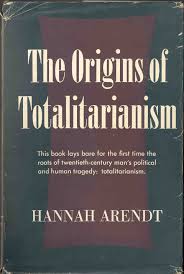New York, Schocken Books: 1951. Revised ed., 2004. (Includes all the prefaces and additions from the 1958, 1968, and 1972 editions.)
Summary:
The Origins of Totalitarianism begins with the rise of anti-Semitism in central and western Europe in the 1800s and continues with an examination of European colonial imperialism from 1884 to the outbreak of World War I. Arendt explores the institutions and operations of totalitarian movements, focusing on the two genuine forms of totalitarian government in our time—Nazi Germany and Stalinist Russia—which she adroitly recognizes were two sides of the same coin, rather than opposing philosophies of Right and Left. From this vantage point, she discusses the evolution of classes into masses, the role of propaganda in dealing with the nontotalitarian world, the use of terror, and the nature of isolation and loneliness as preconditions for total domination.
Table of Contents:
Introduction
Preface to the first edition
I: Antisemitism
Preface
Antisemitism as an outrage to common sense
The Jews, the nation-state, and the birth of antisemitism
The Jews and society
The Dreyfus affair
II: Imperialism
Preface
The political emancipation of the bourgeoisie
Race-thinking before racism
Race and bureaucracy
Continental imperialism: the pan-movements
The decline of the nation-state and the end of the rights of man
III: Totalitarianism
Preface
A classless society
The totalitarian movement
Totalitarianism in power
Ideology and terror: a novel form of government
“Totalitarianism”
“Concluding remarks”
Bibliography
Index
Online:
Amazon
Library of Congress

